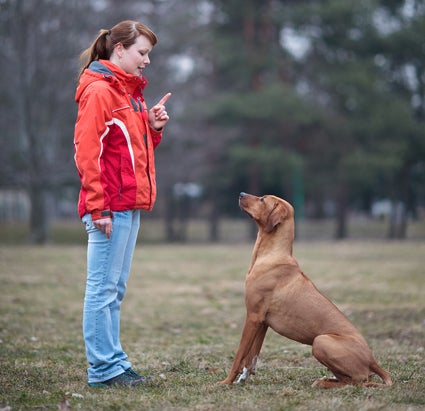Top 10 Ways to Improve Your Dog Training Habits

When you first bring your puppy home it can be easy to get caught up in the excitement of playing with your new canine companion. It is important to realize, however, that the moment you become a dog owner is the moment you take on some very serious responsibilities. In addition to meeting your dog’s needs for a healthy diet and basic veterinary care, you also take on the responsibility of training him. To make sure that your dog is properly trained and socialized, keep the following ten dog training tips in mind:
- Form a positive relationship. They say that dog is a man’s best friend and your dog will certainly become your loyal friend and companion, if you let him. The key to training lies not just in making your dog respond to your commands, but in making him WANT to respond to them. If you and your dog have a positive relationship, your dog will want to please you and it will make training so much easier.
- Do not punish your dog. This rule applies not only to dog training, but to your relationship with your dog at all times. Many people do not realize that if you punish your dog for an undesired behavior (like soiling the rug), your dog is unlikely to connect the punishment with the crime. So, while you might think you are teaching your dog not to repeat the behavior, you are probably just teaching him to be wary or fearful of you.
- Be generous with praise and reward. Dogs are infinitely more likely to repeat a desired behavior if they are rewarded for doing so. That is the primary thing you need to remember about dog training. Not only should you be giving treats, however, you should also be praising your dog so he knows that you approve of his behavior.
- Maintain a firm and consistent hand in leadership. Do not be harsh or violent with your dog, but be clear about your expectations and only reward your dog when he performs the desired behavior on your command. If you only reward your dog half the time he responds appropriately, he may become confused or frustrated and that can hamper your training efforts.
- Pay attention to your dog’s cues. During training and socialization, it is important to pay attention to your dog’s behavioral clues – if he becomes overwhelmed or anxious at any point, you should stop and give him a break. Do not push your dog past his abilities or his comfort level.
- Be clear about your expectations. Your dog cannot respond correctly to your commands if he doesn’t understand what they mean. When you are first teaching your dog a new command, this means that you might have to actually show him what you want – once your dog makes the connection between the command and the desired behavior he will be eager to repeat it as long as he is rewarded.
- Keep it short and sweet. Most dogs will get the hang of a new command with just 3 to 5 repetitions. After that point you will just be reinforcing his mastery of the command. It is also true that dogs tend to get bored with training after just 10 to 15 minutes and this can hamper your results. You want to keep your training sessions fun so your dog remains engaged and this means keeping them short!
- Don’t reinforce undesired behaviors. Not only should you be rewarding desired behaviors during training, but you should also avoid reinforcing undesired behaviors. The biggest mistake most dog owners make is rewarding their puppy for jumping up on people by petting and cuddling them. This only teaches your dog that he gets extra attention if he jumps on people – this is not something you want to teach him.
- Be patient and understanding. Different dogs learn at different speeds so be patient and understanding with your dog during training. Puppies have very limited attention spans and you should keep your expectations realistic during training.
- Don’t overuse treats. While it is important to reward your dog with treats while he is learning a new command, you don’t want to overuse them. Once your dog makes the connection between the command and the behavior, start rewarding him only half the time but keep up with the praise. You should always praise your dog for good behavior, even if you don’t give him a treat every time.
Dog training does not have to be complicated or difficult – it only becomes a problem when you become lax in your duties and you end up having to deal with problem behaviors your dog develops in response to a lack of training. By following the ten tips above you can avoid common dog training mistakes and you can ensure that your puppy develops into a happy, healthy, and well-trained adult dog.
Photo Credit: l i g h t p o e t/Bigstock
Please consult the services of a Professional Dog Trainer, Behaviorist or Veterinarian before implementing any of the advice contained on this site.










 Your Privacy Choices
Your Privacy Choices